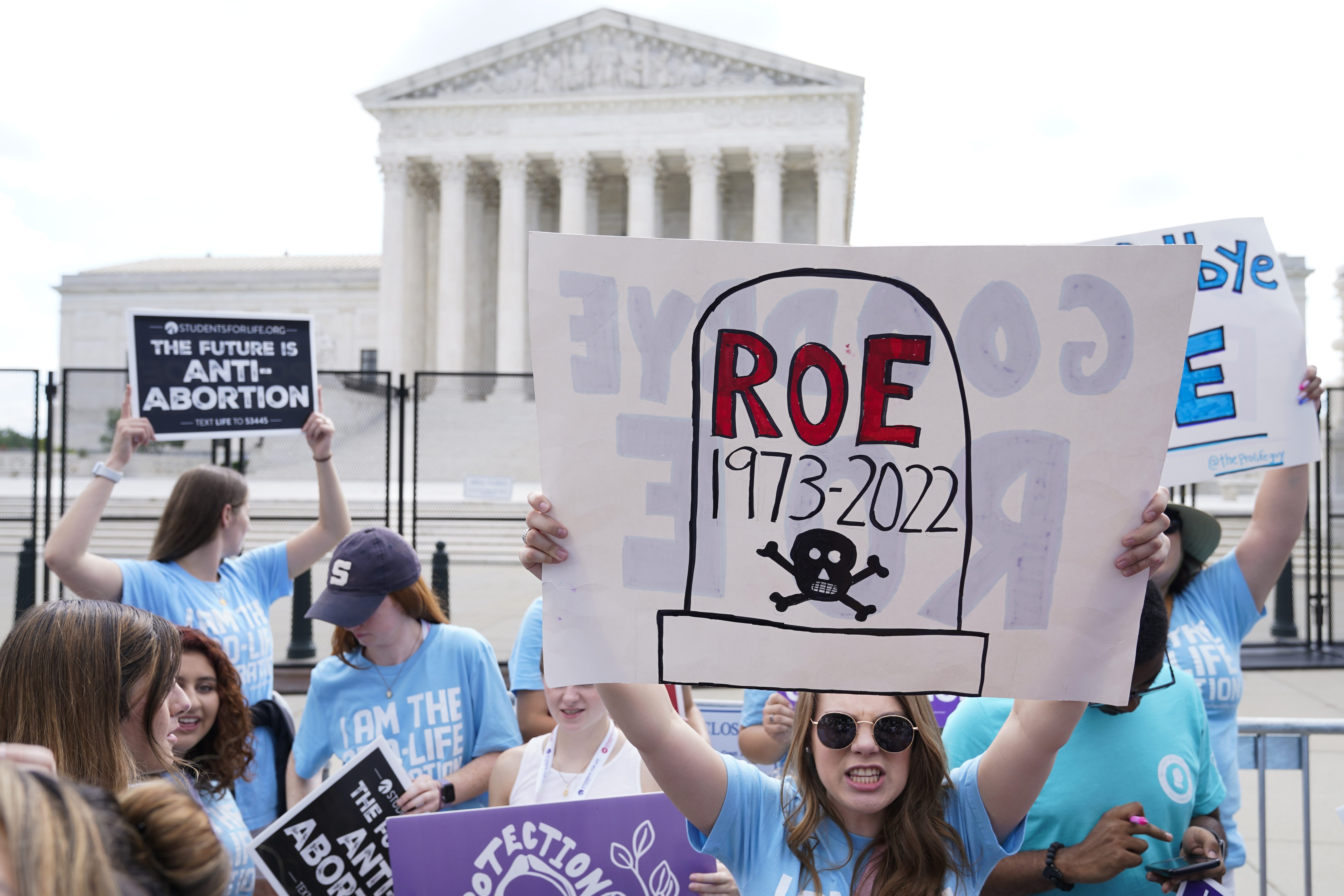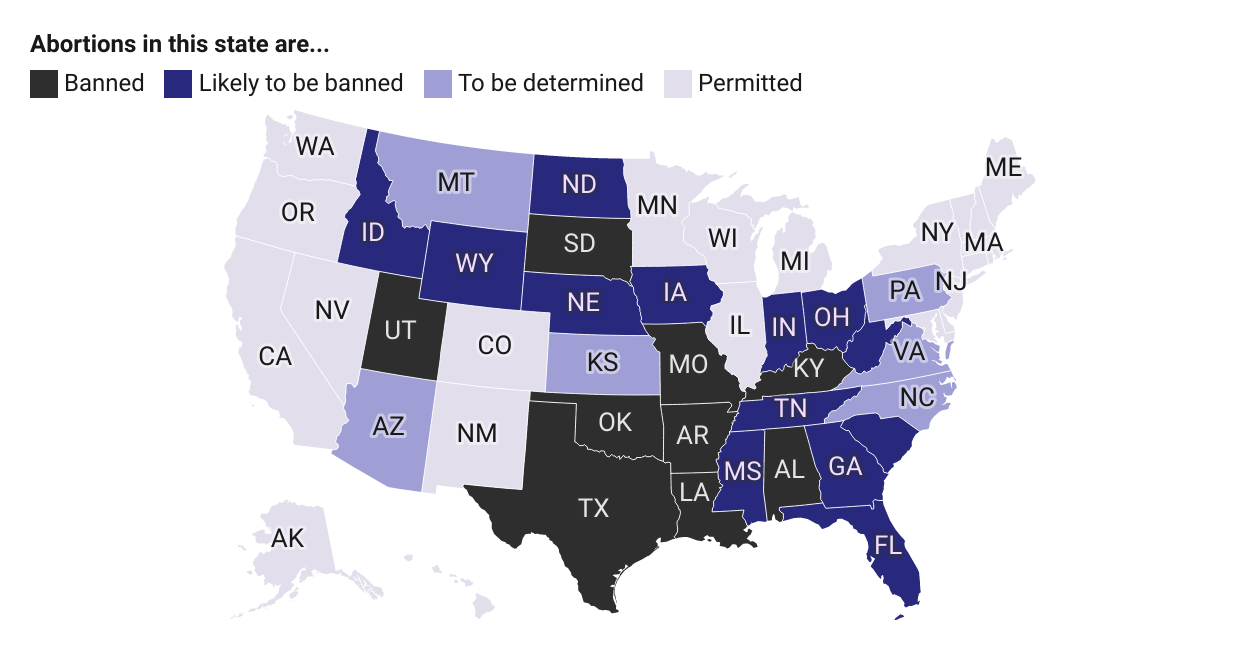The U.S. Supreme Court's decision allowing states to ban abortion immediately stirred alarm Friday among LGBTQ advocates, who feared that the ruling could someday allow a rollback of legal protections for gay relationships, including the right for same-sex couples to marry, other matters based on the right to privacy.
How is abortion connected to gay rights and birth control, legally speaking?
Two of the constitutional provisions the high court relied on to rule in Roe v. Wade were also the basis of their ruling in the other two opinions: the 14th Amendment and "unenumerated rights."
And while Justice Samuel Alito said in the court's majority opinion overturning the 1973 Roe v. Wade decision that it applied only to abortion, critics of the court's conservative majority discounted that statement.
Get top local stories in Philly delivered to you every morning. Sign up for NBC Philadelphia's News Headlines newsletter.
In a separate concurring opinion, Justice Clarence Thomas said the court should review other precedents, including its 2015 decision legalizing same-sex marriage, a 2003 decision striking down laws criminalizing gay sex and a 1965 decision declaring that married couples have a right to use contraception.
What Is the 14th Amendment?
The 14th Amendment was passed in 1868 and largely expanded due process rights of previously enslaved Americans.
There are five sections to the amendment. The best-known declares that no state can “deprive any person of life, liberty or property, without due process of law; nor deny to any person within its jurisdiction the equal protection of the laws.”
The amendment has been invoked in major Supreme Court decisions involving civil rights.
What is an 'unenumerated right'?
Unenumerated rights are those protected under the U.S. Constitution even if it's not explicitly mentioned in the document.
How did the Supreme Court apply the 14th Amendment to the Roe v. Wade decision?
Writing for the majority opinion in Roe v. Wade, Justice Harry Blackmun said that the court held a woman’s right to an abortion was implicit in the right to privacy protected under the 14th Amendment. However, while the Supreme Court ruled in favor of a woman's right to choose, it also acknowledged the state's interest in protecting the "potential of human life."
To balance the competing interests, the court established a "trimester" framework for the legality of abortions:
- First Trimester (up to 12 weeks): Gives a woman an absolute right to an abortion in the first three months of pregnancy.
- Second Trimester (up to 28 weeks: Allows the government to regulate abortion in order to protect the mother’s health, but cannot ban it.
- Third Trimester (up to 40 weeks): Because the fetus is considered "viable" — can survive on its own outside the womb (about 24 weeks of pregnancy) — states can prohibit abortion except in cases when the mother's life is at risk.
However, in 1992, the trimester framework was overturned in a ruling of the Supreme Court case known as Planned Parenthood v. Casey. Though the justices reaffirmed a woman's right to an abortion under Roe, they also gave states more leeway in regulating them in all three trimesters.
The court ruled that in order for a plaintiff to succeed in a constitutional challenge, the law they are protesting must be shown to have the purpose or effect of imposing an "undue burden," which is defined as a "substantial obstacle in the path of a woman seeking an abortion before the fetus attains viability." That meant states could pass regulations that impacted the ability to have the procedure even in the first trimester under the guise of safeguarding a women's health. Under this new test, many abortion restrictions have been upheld.
What other Supreme Court Rulings were based on the 14th Amendment?
Griswold v. Connecticut, which said that a right to privacy exists that bars states from interfering in married couples’ right to buy and use contraceptives.
Lawrence v. Texas, which struck down sodomy laws criminalizing same-sex intimacy.
Obergefell v. Hodges, which legalized gay marriage.
Loving v. Virginia, which legalized interracial marriage.
Will the Supreme Court overturn gay marriage, birth control access and other rights?
Many abortion opponents insist that overturning Roe will not affect access to birth control or LGBTQ rights. Other factors could protect those rulings too: The Obergefell decision that legalized same-sex marriage was based on equal protection, and hundreds of thousands of couples have relied on it to wed and created legal bonds, like shared property, inheritance rights, a precedent that many courts would be loath to disturb.
But a sharp increase in anti-LGBTQ rhetoric in the U.S. and opposition to some forms of birth control from some quarters on the right have advocates concerned that those rights are vulnerable.
“Let’s just be clear. Today is about this horrifying invasion of privacy that this court is now allowing, and when we lose one right that we have relied on and enjoyed, other rights are at risk,” said Jim Obergefell, the plaintiff in the landmark ruling legalizing same-sex marriage, who is now running as a Democrat for the Ohio House.
Then there is Thomas' concurring opinion, which Sarah Warbelow, legal director for the pro-LGBTQ-rights Human Rights Campaign, called an invitation for “stirring up fringe organizations, fringe politicians who want to harm the LGBTQ community.”
“There are clearly members of the court who have an outdated notion of what America looks like today and have a fantasy of returning to their painted idealism of a 1940s, 1950s America, certainly not what it really was in the 1940s and '50s,” she said. “And that is terrifying.”
Connecticut Attorney General William Tong, a Democrat, called the decision “dangerous” and warned that it carves the nation into two parts. He predicted there will be “a tsunami of radical litigation and legislation aimed at further eroding rights we have taken for granted."
“Make no mistake — this is just the beginning of a systematic right-wing effort to rewrite decades of bedrock legal precedent,” he said.
At the White House, President Joe Biden pledged to do everything in his power to defend a woman’s right to have an abortion in states where it will be banned. He warned that the ruling could undermine rights to contraception and gay marriage: “This is an extreme and dangerous path.”



